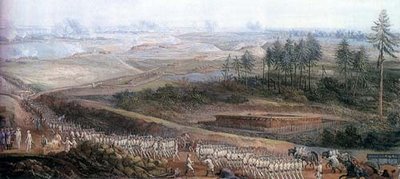
The French forces attacking Redoubt #9 were under the command of Guillaume, Comte de Deux-Ponts. In his memoirs, he recounted the assault this way.
"I advanced in the greatest silence; at a hundred and twenty or thirty paces, we were discovered; and the Hessian soldier who was stationed as a sentinel on the parapet, cried out ' Werda'? [Who comes there?] to which we did not reply, but hastened our steps. The enemy opened -fire the instant after the 'Werda.' We lost not a moment in reaching the abatis, which being strong and well preserved, at about twenty-five paces from the redoubt, cost us many men, and stopped us ' for some minutes, but was cleared away with brave determination; we threw ourselves into the ditch at once, and each one sought to break through the fraises, and. to mount the parapet. We reached there at first in small numbers, and I gave the order to fire; the enemy kept up a sharp fire, and charged us at the point of the bayonet; but no one was driven back. The carpenters, who had worked hard on their part, had made some breaches in the palisades, which helped the main body of the troops in mounting. The parapet was becoming manned visibly.
Our fire was increasing, and making terrible havoc among the enemy, who had placed themselves behind a kind of intrenchment of barrels, where they were well massed, and where all our shots told. We succeeded at the moment when I wished to give the order to leap into the redoubt and charge upon the enemy with the bayonet; then they laid down their arms, and we leaped in with more tranquillity and less risk. I shouted immediately the cry of Vive le Roi, which was repeated by all the grenadiers and chasseurs who were in good condition, by all the troops in the trenches, and to which the enemy replied by a general discharge of artillery and musketry. I never saw a sight more beautiful or more majestic. I did not stop to look at it; I had to give attention to the wounded, and directions to be observed towards the prisoners. At the same true, the Baron de Viomesnil [Vioménil] came to give me orders to be prepared for a vigorous defence, as it would be important for the enemy to attempt to retake this work. An active enemy would not have failed, and the Baron de Viomesnil [Vioménil] judged the English general by himself. I made my dispositions to the best of my ability; the enemy showered bullets upon us. I did not doubt that the idea of the Baron de Viomesnil [Vioménil] would be fulfilled. Finally, when all was over, a sentinel, charged with observing the movements without, called inc, and said that seine of the enemy were appearing. I raised my head above the parapet, and at the same time a ball, which ricochetted in the parapet, and passed very near my head, covered my face with sand and gravel. I suffered much, and was obliged to leave the place, and, to be conducted to the ambulance.
Fifty-six grenadiers and chasseurs of the regiment of Gatinois, twenty-one grenadiers and chasseurs of the Royal Deuxponts, six chasseurs of the Agenois, and nine soldiers of the second battalion of the Gatinois, have been killed or wounded, in this attack, which lasted only seven minutes. Moreover, M. de Barthelot, captain of the regiment of Gatinois, was killed; M. de Sireuil, captain of the chasseurs of this regiment,*** had his leg broken, and M.de Sillegue, second lieutenant of chasseurs was shot through his thigh. The Chevalier de La Meth received two musket balls, one of which broke his, knee-pan, and the other pierced his thigh. He volunteered for this attack, as also did the Count de Damas; I endeavored to prevent their doing so; but neither of them listened to the representations that would have kept them from glory. The Count de Vauban was also at my attack, and was charged by the Count de Rochambeau to be present in order to give him an account of the affair."

No comments:
Post a Comment